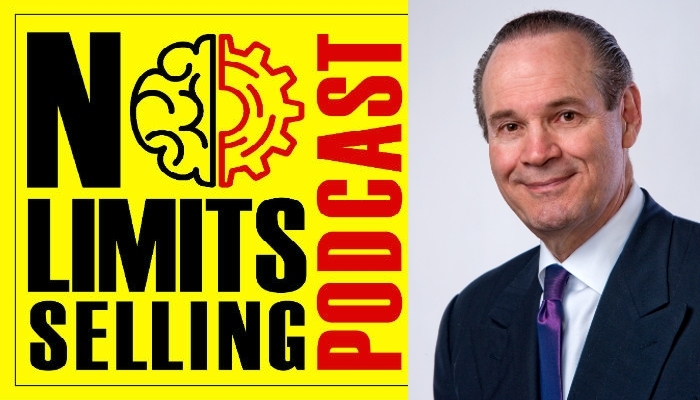Talking Personality with Dr. Tony Alessandra PhD
On Episode 79 of The No Limits Selling Podcast, we have Dr. Tony Alessandra Ph.D., Founder of Assessments 24x7 Canada. Dr. Tony Alessandra has a street-wise, college-smart perspective on business, having been raised in the housing projects of NYC to eventually realizing success as a graduate professor of marketing, entrepreneur, business author, and hall-of-fame keynote speaker. He earned a BBA from the Univ. of Notre Dame, an MBA from the Univ. of Connecticut, and his Ph.D. in marketing from Georgia State University.
In addition to being president of Assessment Business Center, a company that offers online 360º assessments, Tony is also a founding partner in The Cyrano Group and Platinum Rule Group--companies that have successfully combined cutting-edge technology and proven psychology to give salespeople the ability to build and maintain positive relationships with hundreds of clients and prospects.
Dr. Alessandra is a prolific author with 27 books translated into over 50 foreign language editions, including the newly revised, best-selling The NEW Art of Managing People, Charisma, The Platinum Rule, Collaborative Selling, and Communicating at Work. He is featured in over 100 audio/video programs and films, including Relationship Strategies, The Dynamics of Effective Listening, and Non-Manipulative Selling.
Recognized by Meetings & Conventions Magazine as "one of America's most electrifying speakers," Dr. Alessandra was inducted into the Speakers Hall of Fame in 1985. In 2009 and 2010, he was inducted as one of the “Legends of the Speaking Profession” and in 2010 and 2011 he was selected as one of the Top 5 Marketing Speakers by Speaking.com.

Contact Dr. Tony Alessandra:
- Dr. Tony’s Products
- Keynote speeches: Holli Catchpole: Phone: 1-760-603-8110 ● Email: [email protected]
- Corporate training: Scott Zimmerman: Phone: 1-330-848-0444 x2 ● Email: [email protected]
- Platinum Rule Group CRM System: Scott Zimmerman: Phone: 1-330-848-0444 x2 ● Email: [email protected]
[EDITOR’S NOTE: This podcast is sponsored by No Limits Selling. It is a fun, fast-paced podcast that delivers hard-fought business advice that you can implement today to improve your sales and performance]
Interested In Our Real Estate Coaching Services? Explore Our Website: Link
Feeling Not Well Today? You Can Use Our Mindset Boosters App To amp Up Your Mood: Link
Find us on Social Media:
LinkedIn | Facebook community | Instagram
Like what do you listen to? Subscribe to our podcast!
Ready to become fearless? We can help you become fearless in 60 days so you accomplish more in your career Schedule A 15 min Call with UmarSummary
Introduction
The podcast begins with an introduction of Tony Alessandra, a renowned speaker, author, and sales expert. Tony is known for his expertise in the fields of communication, customer loyalty, and personal development. He has authored 31 books and has been inducted into the Speakers Hall of Fame.
The Platinum Rule
Tony discusses the Platinum Rule, a concept he developed that contrasts with the Golden Rule. While the Golden Rule suggests treating others as you would like to be treated, the Platinum Rule advises treating others as they want to be treated. This rule is crucial in sales and customer service, as it emphasizes understanding and meeting the customer's needs and preferences.
Adaptability in Sales
Tony emphasizes the importance of adaptability in sales. He explains that salespeople need to adjust their selling style to match the buying style of the customer. This approach requires understanding the customer's personality and communication style. Tony suggests using behavioral assessments to gain insights into a customer's preferences and behaviors.
Building Trust and Rapport
The podcast delves into the importance of building trust and rapport with customers. Tony advises salespeople to be genuine, show empathy, and demonstrate competence to earn the trust of customers. He also highlights the significance of active listening in building rapport.
The DISC Model
Tony introduces the DISC model, a behavioral assessment tool that categorizes people into four primary behavioral styles: Dominance, Influence, Steadiness, and Compliance. He explains how understanding these styles can help salespeople adapt their approach to match the customer's style, leading to more effective communication and improved sales outcomes.
Customer Loyalty
The podcast concludes with a discussion on customer loyalty. Tony explains that customer loyalty is not just about repeat business but also about customers becoming advocates for your brand. He suggests that businesses can foster loyalty by consistently exceeding customer expectations, providing exceptional service, and building strong relationships.
Conclusion
In conclusion, the podcast interview with Tony Alessandra offers profound insights into successful sales strategies. It underscores the importance of the Platinum Rule, which advocates for understanding and catering to customers' unique needs and preferences. Alessandra emphasizes the necessity of adaptability in sales, suggesting that salespeople should align their selling style with the customer's buying style, which can be discerned through behavioral assessments. The conversation highlights the crucial role of building trust and rapport, with active listening being a key component. Alessandra introduces the DISC model as a tool to understand customer behavior and improve communication.
Finally, the podcast concludes with a discussion on customer loyalty, emphasizing that it extends beyond repeat business to include advocacy for the brand, achieved through exceeding customer expectations, providing exceptional service, and nurturing strong relationships.
Questions & Answers
What is the Platinum Rule that Tony Alessandra talks about in the podcast?
How does Tony Alessandra suggest salespeople adapt their selling style?
What is the DISC model that Tony Alessandra mentions in the podcast?
How does Tony Alessandra define customer loyalty in the podcast?
What are Tony Alessandra's tips for building trust and rapport with customers?
Don’t miss this opportunity to transform your real estate career with one-on-one coaching. As an experienced real estate coach, I, Umar Hameed, am dedicated to helping you unlock your full potential and achieve your real estate goals. To learn more about who am I and my clients ↓
If you’re ready to take the next step, book an appointment with me today and begin your journey toward success in the real estate industry.
